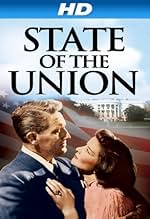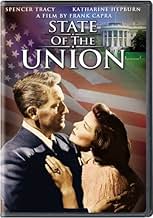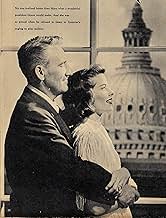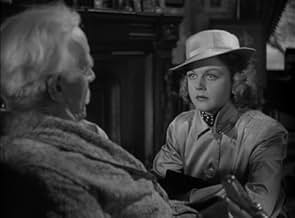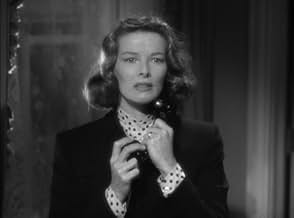NOTE IMDb
7,2/10
4,5 k
MA NOTE
Un industriel est poussé à se présenter à la présidence, mais cela nécessite des compromis inconfortables, tant sur le plan politique que conjugal.Un industriel est poussé à se présenter à la présidence, mais cela nécessite des compromis inconfortables, tant sur le plan politique que conjugal.Un industriel est poussé à se présenter à la présidence, mais cela nécessite des compromis inconfortables, tant sur le plan politique que conjugal.
- Réalisation
- Scénario
- Casting principal
- Récompenses
- 3 victoires et 1 nomination au total
Georgie Nokes
- Grant Matthews Jr.
- (as George Nokes)
Avis à la une
`Is there any difference between Democrats and Republicans?' `The difference is that they're in and we're out.' -- A line from State of the Union, one of only a handful of political films to use direct partisan language.
Based on a 1945 play by Howard Lindsay and Russell Crouse, State of the Union marked Frank Capra's return to the political genera. This film is also the third of nine pictures featuring Spencer Tracey and Katharine Hepburn. In this outing, Tracey plays Grant Matthews, a famous aircraft tycoon courted by the Republican Party to become their candidate for President of the United States. The film's title, in addition to referring to the country, is also a metaphor for Matthews' relationship with his wife, Mary (Hepburn). The two are having marital problems sparked by Matthews' affair with a newspaper heir Kay Thorndyke (played by a 22-year-old Angela Lansbury convincingly portraying a woman in her forties).
Once the campaign is underway, the classic theme of a good man sacrificing his ideals in order to win begins to surface. Matthews' speeches are reworked as to not offend any big political establishments (e.g. big business, labor, agriculture, etc.), and soon he begins to loose his own voice along with his identity. Finally, in the film's climax, Matthews is forced to choose between a certain nomination for the presidency or a wife who represents his true character.
Incidentally, for a movie centered on a republican character, State of the Union does not focus on a conventional conservative theme, nor does it only target liberals. The film ribs big business, `the American Dream is not about making money,' in addition to labor. And even though Harry S Truman is the subject of several quips, he was said to have really enjoyed the film, often playing it on his presidential yacht.
At the box office, State of the Union performed better in smaller outlets than large markets. It premiered at New York's Radio City Music Hall to a opening week of $137,000, `this is a bit under hopes, especially in view of intensive advance campaign and strong reviews,' reported Varitey. In Los Angeles, the film opened at No. 1 with $52,000 but `not a smash.' Though in markets such as Minneapolis, Kansas City and Seattle, the film pulled big numbers. Overall the film was a success, but it did not match the box office bounty of Capra's earlier films including Mr. Smith Goes to Washington or the other Tracey/Hepburn parings for that matter (e.g. Adam's Rib, Pat & Mike, Guess Who's Coming to Dinner).
Based on a 1945 play by Howard Lindsay and Russell Crouse, State of the Union marked Frank Capra's return to the political genera. This film is also the third of nine pictures featuring Spencer Tracey and Katharine Hepburn. In this outing, Tracey plays Grant Matthews, a famous aircraft tycoon courted by the Republican Party to become their candidate for President of the United States. The film's title, in addition to referring to the country, is also a metaphor for Matthews' relationship with his wife, Mary (Hepburn). The two are having marital problems sparked by Matthews' affair with a newspaper heir Kay Thorndyke (played by a 22-year-old Angela Lansbury convincingly portraying a woman in her forties).
Once the campaign is underway, the classic theme of a good man sacrificing his ideals in order to win begins to surface. Matthews' speeches are reworked as to not offend any big political establishments (e.g. big business, labor, agriculture, etc.), and soon he begins to loose his own voice along with his identity. Finally, in the film's climax, Matthews is forced to choose between a certain nomination for the presidency or a wife who represents his true character.
Incidentally, for a movie centered on a republican character, State of the Union does not focus on a conventional conservative theme, nor does it only target liberals. The film ribs big business, `the American Dream is not about making money,' in addition to labor. And even though Harry S Truman is the subject of several quips, he was said to have really enjoyed the film, often playing it on his presidential yacht.
At the box office, State of the Union performed better in smaller outlets than large markets. It premiered at New York's Radio City Music Hall to a opening week of $137,000, `this is a bit under hopes, especially in view of intensive advance campaign and strong reviews,' reported Varitey. In Los Angeles, the film opened at No. 1 with $52,000 but `not a smash.' Though in markets such as Minneapolis, Kansas City and Seattle, the film pulled big numbers. Overall the film was a success, but it did not match the box office bounty of Capra's earlier films including Mr. Smith Goes to Washington or the other Tracey/Hepburn parings for that matter (e.g. Adam's Rib, Pat & Mike, Guess Who's Coming to Dinner).
This is an outstanding movie that belongs in the standard viewing repertoire of great movies from the 1940's. There is a reason this movie is not so well known. It was obviously filmed as a big MGM production (you can hear the lion's roar on the soundtrack!) that became owned by Frank Capra's Liberty Films. The script is very intelligent and demonstrates a knowing cynicism of the political world, but much more believable and less sentimental than Mr. Smith or other Capra films. Most people have seen only a few Tracy-Hepburn movies. Hopefully with Hepburn's recent passing the rights owner will produce a digitally restored DVD with background explaining the history and perspective of this seldom seen classic.
In the 1980 New Hampshire primary, an exasperated Ronald Reagan blurted out the famous line "I'm paying for this microphone!" when a moderator threaten to turn off the microphones at an unruly debate. It was a hugely successful and defining moment for Reagan, nailing down his image as a man of rugged independence who refused to suffer fools gladly -- to say nothing of his ability to craft a clever quip. However, given his Hollywood roots, it seems more likely he consciously or unconsciously lifted this line from Spencer Tracy's character in "State of the Union."
Politics then and now, what's the difference? "People are beginning to think that there is no difference between the Republican and the Democratic party" Sounds familiar? Special interests groups, lobbyists, mercenaries and somewhere in the middle of it all Spencer Tracy and Katharine Hepburn, projecting the hopes of all well meaning Americans, or earthlings in general for that matter. The chemistry between Tracy and Hepburn is so all consuming that whatever we see them do or hear them say we believe, we believe totally. As if this was not enough, Adelph Menjou gives his character a truth that is as relevant and uncomfortable as it is entertaining. But the crowning jewel of this wonderful film is Angela Lansbury - she was barely 20 years old when she made this movie and look at her, just look at her. Not merely holding her own with seasoned stars like Tracy and Hepburn but at times, overshadowing them. This is considered a minor Capra, I just say, you must be kidding.
This somewhat forgotten 1948 dramedy is not the undiscovered gem of the Tracy-Hepburn pairings, but the 2006 DVD provides an opportunity to take a look at the political corruption running rampant in Washington at the time, clearly as prescient now as it was relevant then. The subject is well suited to film-making legend Frank Capra, who made the classic "Mr. Smith Goes to Washington" a decade earlier and echoes a similar theme of an honest man surrounded by those who tear at his ethics. Adapted by Anthony Veiller and Myles Connolly from a play by Russel Crouse and Howard Lindsay, the plot centers on Grant Matthews, a pulled-from-his-bootstraps industrialist who has not lost touch with the common folks, a quality seized upon by Machiavellian newspaper publisher Kay Thorndyke, who uses her considerable media power to shape him into a viable candidate for the presidency.
Thorndyke also happens to be Matthews' lover, even though he is still married to stoic, disillusioned Mary, his estranged wife who has remained in the marriage not only for the sake of their two children but also in the dimming hope that he will come back to her. Initially, Matthews balks at the idea of becoming President, but he recognizes an ambition to improve the country. At the same time, Thorndyke and her cohort, proto-Karl Rove political adviser Jim Conover convince him to make compromising speeches to win the votes of powerful lobbies. If you know Capra films, you know how it will all turn out. The main problem I had with the film is the pacing and the relative inconsistency in tone. Much of the time, it feels truncated with little transition between scenes, and farcical moments are mixed with more serious ones in ways that make the film feel emotionally askew at times.
The performances can't be faulted. Spencer Tracy is well cast as the plainspoken Matthews, while Katharine Hepburn lends her much-needed verve and snap to the cautiously hopeful Mary. All of 22 but looking far more commanding and mature, Angela Lansbury almost steals the picture as Kay, even though her character is so venal and humorless that it is hard not to hiss when she's on screen, especially with her dragon-lady cigarette holder. It's easy to see the future Mrs. Iselin in John Frankenheimer's "The Manchurian Candidate". Adolphe Menjou plays Conover in his typical blowhard manner, while Van Johnson is unctuous in a likable sort of way as reporter Spike McManus. Capra lays out his familiar flag-waving cornpone thickly here, sometimes quite effectively, but the attempts at slapstick humor are pretty laborious. This remains an interesting curio in his canon. The DVD provides a fairly clean print but has absolutely no extras, not even chapter stops.
Thorndyke also happens to be Matthews' lover, even though he is still married to stoic, disillusioned Mary, his estranged wife who has remained in the marriage not only for the sake of their two children but also in the dimming hope that he will come back to her. Initially, Matthews balks at the idea of becoming President, but he recognizes an ambition to improve the country. At the same time, Thorndyke and her cohort, proto-Karl Rove political adviser Jim Conover convince him to make compromising speeches to win the votes of powerful lobbies. If you know Capra films, you know how it will all turn out. The main problem I had with the film is the pacing and the relative inconsistency in tone. Much of the time, it feels truncated with little transition between scenes, and farcical moments are mixed with more serious ones in ways that make the film feel emotionally askew at times.
The performances can't be faulted. Spencer Tracy is well cast as the plainspoken Matthews, while Katharine Hepburn lends her much-needed verve and snap to the cautiously hopeful Mary. All of 22 but looking far more commanding and mature, Angela Lansbury almost steals the picture as Kay, even though her character is so venal and humorless that it is hard not to hiss when she's on screen, especially with her dragon-lady cigarette holder. It's easy to see the future Mrs. Iselin in John Frankenheimer's "The Manchurian Candidate". Adolphe Menjou plays Conover in his typical blowhard manner, while Van Johnson is unctuous in a likable sort of way as reporter Spike McManus. Capra lays out his familiar flag-waving cornpone thickly here, sometimes quite effectively, but the attempts at slapstick humor are pretty laborious. This remains an interesting curio in his canon. The DVD provides a fairly clean print but has absolutely no extras, not even chapter stops.
Le saviez-vous
- AnecdotesClaudette Colbert was originally cast to play Mary Matthews. A few days before production began, Producer and Director Frank Capra fired her from this movie because she refused to work into the evening. Capra then hired Katharine Hepburn on Spencer Tracy's suggestion.
- GaffesKatharine Hepburn's name is misspelled in the opening credits as "Katherine". This is the result of the original MGM opening credits (MGM was the original theatrical distributor) being replaced by haphazardly-designed replacement credits when MGM's distribution rights expired.
- Citations
Mary Matthews: Oh, that's silly. No woman could ever run for President. She'd have to admit she's over 35.
- Crédits fousWhen this film was reissued, new titles and credits were printed. The original end cast listing was retained, so the cast names which are misspelled in the reissue's opening credits are spelled correctly in the closing cast list.
- ConnexionsFeatured in MGM: When the Lion Roars (1992)
Meilleurs choix
Connectez-vous pour évaluer et suivre la liste de favoris afin de recevoir des recommandations personnalisées
Détails
Box-office
- Budget
- 2 600 000 $US (estimé)
- Durée
- 2h 4min(124 min)
- Couleur
- Rapport de forme
- 1.37 : 1
Contribuer à cette page
Suggérer une modification ou ajouter du contenu manquant



